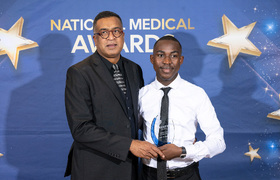Prof Mosedi Namane’s legacy of community-rooted medicine
05 November 2025 | Story Nomfundo Xolo. Photos Ruairi Abrahams. Read time 6 min.Professor Mosedi Namane’s journey from being one of the University of Cape Town’s (UCT) first black African medical graduates (MBChB, 1990) to a pioneer of community-rooted healthcare reflects a lifetime spent connecting primary healthcare, education and social justice into the everyday lives of the people she serves.
Professor Namane moves swiftly through the corridors of the Vanguard Student Learning Centre in Bonteheuwel, pausing to troubleshoot with colleagues before proudly observing her students leading a workshop for community healthcare workers. It’s a rhythm that defines her work: steady, purposeful, and deeply connected to the people around her. Each stride reflects her belief that medicine belongs within the community it serves.
For nearly four decades, Namane’s life has unfolded at the intersection of medicine and community. As one of the first two black African graduates from UCT’s Faculty of Health Sciences in 1990, she began her journey in an environment that, as she recalls, “didn’t look like it was for people like me”. Yet, she stayed, turning exclusion into leadership and helping to redefine how medicine is taught and practised in South Africa.
Now nearing retirement, Namane remains a steady presence, guiding, correcting, and celebrating the students who pass through the doors she helped open. “The systems are rooted; the seeds have been planted,” she said. “They just need to be nurtured for the future.”
Breaking barriers
Namane entered UCT in 1986, part of a generation coming of age on the brink of democracy. “We were the first black students to walk those halls,” she noted. “You had to be resilient. You had to hold on to the reason you came to study.”
“I was in the first cohort that started writing the textbooks, building the department, drafting the new curriculum.”
After graduating, she joined the Faculty of Health Sciences as a lecturer and later became an associate professor in the Division of Family Medicine. Those early experiences of alienation shaped her lifelong commitment to transformation – not through rhetoric, but through the slow, deliberate work of building systems that last.
“I was in the first cohort that started writing the textbooks, building the department, drafting the new curriculum for UCT’s Faculty of Health Sciences,” she said.
From the lecture hall to the clinic
At the dawn of democracy, South Africa’s new government placed community-based primary healthcare at the centre of its policy vision. Universities were called to reimagine their curricula to serve that mandate. For Namane, it was an opportunity to merge two worlds: academia and public service.
In 2005, she helped establish the Vanguard Student Learning Centre, funded by the Rangoonwala Foundation in the United Kingdom and the Liberty Foundation in South Africa. The centre became the physical embodiment of her philosophy: a bridge between the university and the communities it serves. “The dual role worked perfectly,” she explained. “I could marry community-based education and primary healthcare delivery to make sure there is fluidity between academia and the services people rely on.”
At Vanguard, final-year students rotate through the clinic as part of their service-learning curriculum, working alongside community nurses and clinicians. Inside the consulting rooms, students from audiology, physiotherapy, speech therapy, and family medicine collaborate under Namane’s guidance.

For Bonteheuwel residents, the impact has been tangible. The clinic provides chronic disease management, maternal and child health, rehabilitation, and mental health services once accessible only at distant hospitals. “It’s a win-win,” said Namane. “The students learn, and the community gains care that improves their quality of life.”
Beyond the clinic, Namane’s influence extends into classrooms, research, and policy. She co-authored core family medicine textbooks, contributed to national policy on safe medicine use, and published internationally on community-based health systems.
She also served as a LANCET Commissioner on Osteoarthritis and collaborated with the University of Oxford on global health partnerships. Yet, she insisted, her proudest contribution is local: the cultivation of a generation of socially conscious doctors.
UCT as home and foundation
UCT has been more than a workplace for Namane – it is where she met her late husband, raised her daughter, and built her academic home. Over the years, she witnessed the university’s gradual transformation. “When I look at today’s students, I see representation that wasn’t there before,” she said. “They come from every background; they speak every language – the world is their oyster.”
As clinical head, in a joint appointment with the Western Cape Department of Health, Namane helped make Vanguard a national model for community-embedded medical education. The research emerging from the centre, on maternal health, mental health advocacy, and interprofessional learning, continues to inform provincial policy. “When something is identified as a problem, we ask how to solve it,” she explained. “Then we test it, write about it, and publish it.”
“I’ve given my all, especially to undergraduate education. Now it’s time for others to grow the garden.”
After officially retiring in September 2025, Namane will continue teaching postgraduate students before assuming the title of emeritus professor. She plans to supervise research, update medical textbooks, and continue her volunteer work. “I’ve given my all, especially to undergraduate education. Now it’s time for others to grow the garden.”
Retirement for Namane is not an ending but a new rhythm. She intends to deepen her research on community rheumatology, help establish a new unit in family medicine, and continue mentoring young clinicians. “The vision has grown bigger than when I started,” she said. “Back then, I wanted to be a general practitioner. Now, I see that the real work is helping others see health as collective well-being.”
 This work is licensed under a Creative Commons Attribution-NoDerivatives 4.0 International License.
This work is licensed under a Creative Commons Attribution-NoDerivatives 4.0 International License.
Please view the republishing articles page for more information.












